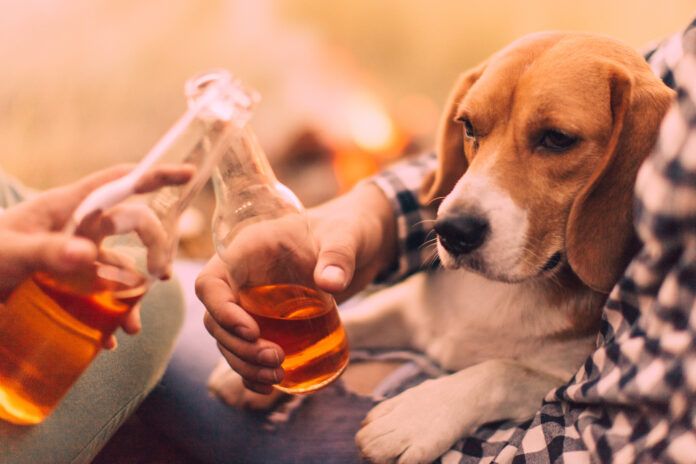Though you may have seen pictures, memes, and videos on social media about drunk dogs, we have a simple public service announcement on behalf of all canine-kind: Dogs should not booze it up.
Experts say dogs do not want to be intoxicated; buzzed dogs are not funny, and canine alcohol consumption can be dangerous, even deadly.
“Please don’t give pets alcohol,” says veterinarian Lori Teller, a clinical professor at Texas A&M University College of Veterinary Medicine and Biomedical Sciences. “Just don’t do it.”
What Happens if a Dog Drinks Alcohol?
So, what’s so bad if a dog has a drink? What could happen if a pup sips a nip?
Alcohol is a central nervous system depressant and consuming it can have catastrophic impacts on a dog’s essential organs (heart, liver, pancreas, kidneys, and brain).
“Dogs do not metabolize alcohol like [human] adults do,” Dr. Teller says. “Small children and dogs have not developed the enzymes to metabolize alcohol. You don’t give alcohol to small children, and we don’t give it to dogs.”
Ingesting liquor can lower a dog’s blood sugar, making them weak and leading to seizures. It also affects their ability to regulate body temperature, causing them to be susceptible to hypothermic shock.
“Alcohol can impact a dog’s respiration to the point where it becomes very slow or even stops,” Dr. Teller says. “They can go into a coma, and if they don’t get medical treatment, they could die.”
If you’re wondering, “Can dogs get drunk?”, the answer is yes. Dogs can get drunk very quickly on minimal amounts of alcohol and end up with way more than a hangover.
Ingesting alcohol can cause diarrhea and vomiting, which can lead to other serious complications.
“One of the biggest concerns with intoxicated pets is that they will vomit and be unable to protect their airway; if this happens, they can inhale the vomit into their lungs and contract pneumonia, which can be very severe,” says veterinarian Tina Wismer, senior director of toxicology at the ASPCA Animal Poison Control Center.
The organization’s staff fielded more than 500 calls last year from people worrying how much danger their pets were in after they drank alcohol.
How Much Alcohol is Dangerous for Dogs?
Is a slurp of a drink detrimental to a dog? What about a gulp? How much is dangerous? There’s no one easy answer. It all depends on the type of alcohol a dog drank, how much they consumed, and the dog’s weight.
“As dogs typically weigh less than people, it will take less volume to cause drunkenness,” Dr. Wismer says.
The percentage of alcohol in different drinks varies and even some mocktails and “nonalcoholic” beers may have low levels of alcohol.
Most traditional beer contains about 5% alcohol, wine has around 12%, vodka and gin have approximately 40%, and grain alcohol typically has upward of 90%. The higher the alcohol concentration, the more quickly it will take effect and the greater chance a pooch will have a potential problem.
That’s why it’s critical to recognize the symptoms of alcohol poisoning and seek medical help.
Symptoms of Alcohol Poisoning in Dogs
The signs of alcohol poisoning can be acute. The dog may become disoriented and uncoordinated; their respiratory rate may drop; they may have muscle tremors and even become nonresponsive.
“Typically, signs of depression and drunkenness in dogs appear within an hour of alcohol ingestion, including difficulty walking, sedation, and stomach upset,” Dr. Wismer says.
You may not even realize a dog who seems sick and is exhibiting these signs drank alcohol. Perhaps there’s a party or a backyard cookout, someone leaves their drink unattended, and the resident pooch decides, “It smells good to me!” and laps it up.
Then, the dog suddenly starts to appear ill. Whether you know a dog ingested alcohol or suspect it, get medical help immediately.
What Should I Do If My Dog Drank Alcohol?
Time is of the essence because of the detrimental impact alcohol has on a dog’s body.
Contact your veterinarian, your closest animal emergency hospital, or the ASPCA Animal Poison Control Center’s 24-hour hotline at (888) 426-4435. If your dog is exhibiting symptoms of alcohol poisoning, get in the car and head to the ER.
“The sooner you seek care, the better,” Dr. Teller says. “It may involve intravenous fluids and supportive care. If your dog has tremors, seizures, vomiting, or diarrhea, you need to get those under control.”
There’s no antidote for alcohol poisoning in dogs (or people), so the more supportive care a dog can receive to treat their symptoms, the better their chances of improving.
Avoiding Alcohol Altogether
Not to be a buzzkill here, but you don’t want to be the one who calls an animal hospital or the poison control hotline and says, “My dog drank beer. Will he be okay?” because he might not be.
Don’t let a dog get close to alcohol or in a position to counter or table surf a drink.
“Always keep an eye on your beverages and never place drinks, bottles, or cans of alcohol at your pets’ level,” Dr. Wismer says.
If you’re having a party and you want your pets to be part of it, consider making an alcohol-free zone for them to be in. That helps minimize the temptation and danger—and it’s not only the alcohol that’s risky.
Some cocktail mixes and drinks contain artificial sweeteners like xylitol. “Even extremely small amounts of xylitol can cause significant damage to a dog’s body, resulting in liver failure,” Dr. Teller says.
So, the next time you see a drunk dog post on social media, don’t hit “like,” don’t share it, and most of all, don’t try it at home.
“Pets are important members of our family; they do not get the same enjoyment from alcohol that people might,” Dr. Teller says. “People should not be condoning it. It can be a reason for an investigation into animal abuse. It’s just not funny.”






